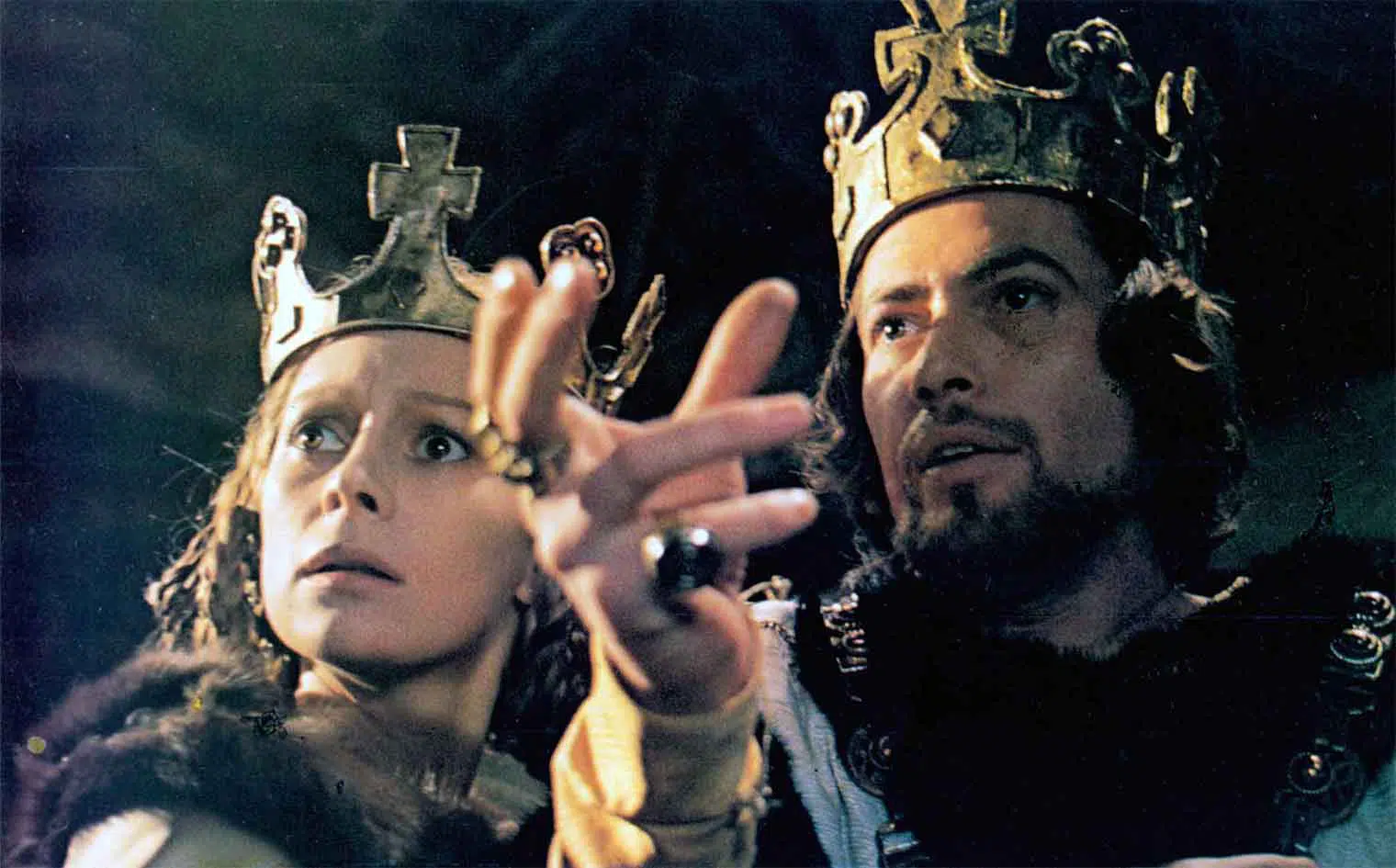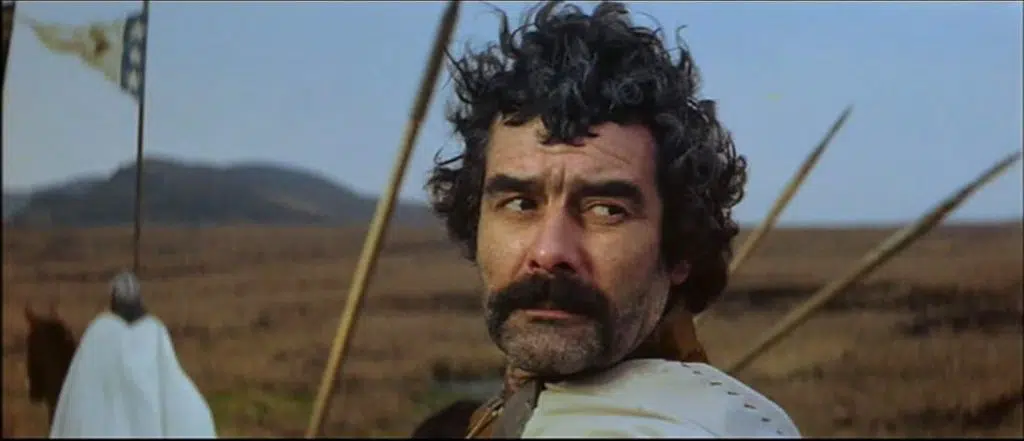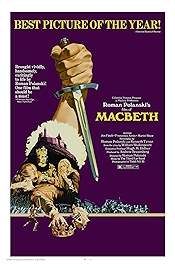In 1971, less than two years after his wife, Sharon Tate, and unborn child had been murdered by Charles Manson and his mad followers, Roman Polanski went to work on his version of Macbeth (aka The Tragedy of Macbeth). “Exorcising the demons” is how the result is often described. Whether you buy into the pop psychology or not, this commercial flop is a bloody and brutal film, and a remarkably powerful one – direct, cinematic, taut and… yes… bloody.
Polanski got in Kenneth Tynan – at the time the UK’s most famous critic, the literary manager at the National Theatre and infamous as the first man to say “fuck” on British television – to help him adapt Shakespeare’s play. Together they produced something that’s faithful to the original but also modern and sleek, which takes pains to keep the audience abreast of the salient plot points by repeating them (count the number of times Dunsinane is mentioned, and the “no man of woman born” twist on which Macbeth’s fate hinges).
But I’m getting ahead of the plot, which remains essentially the same. Macbeth, Thane (ie Lord) of Glamis, is told by three witches he meets on a “blasted heath” that he will in time become Thane of Cawdor and then King of Scotland, but that his children will not be kings. That honour will go to his companion, Banquo. Macbeth’s interest is instantly piqued but, after tossing the wild notion around for a while, he comes to the conclusion that the witches are most likely talking nonsense. And then he gets back home to his castle and discovers that the King has indeed made him Thane of Cawdor. Realising suddenly that fate has his back, Macbeth embarks on another, much more furious, debate with himself. He could just let events take their course – the kingship will surely come his way anyway. But irrationality has soon barged reason out of the way. Egged on by his wife’s taunts that he’s too “full of the milk of human kindness” (© William Shakespeare) and isn’t man enough to do the job, Macbeth kills King Duncan and seizes the crown before turning his attention to Banquo…
It does not end well, and in the Tynan/Polanski realisation, much blood is shed on screen in scenes that horrified many cinemagoers. Crew members too. When one questioned the director’s bloody take on Shakespeare’s play, Polanski apparently replied, “I know violence. You should’ve seen my house last summer.”
There are echoes of the Manson murders everywhere, not least in the skew that Tynan and Polanski have put on the Macbeth/Lady Macbeth relationship. Gone is Lady Macbeth as the driving force behind Macbeth’s murderous spree. Here Macbeth is a weak man driven into a kind of psychosis by the voices in his head (Shakespeare’s soliloquies brilliantly repurposed). Psychology trumps the supernatural.
This is a film that gets just about everything right. The casting is perfect, with Jon Finch, in his late 20s at the time, the right age to play a man in a hurry who feels he’s paid his dues and now it’s time to collect. He’s a handsome and petulant Macbeth, a silly and insecure man who goes so far as to aping the vocal timbre of the dead king after assuming the crown, because that’s how kings talk, right? Martin Shaw as the steadfast but not stupid Banquo, Nicholas Selby as the noble and gracious (and soon to be dead) King Duncan, Terence Bayler as the believeably tough Macduff, the man not “of woman born” who will prove to be Macbeth’s nemesis. Francesca Annis’s Lady Macbeth, a woman with a sexual hold over her husband, eyes aglow with ambition.
Polanski works hard to open the play out. Shooting in castles in Northumberland, or out on wild moors and the mountainsides of Wales, he keeps the camera moving and fills his frames with armies receding in the distance, or pigs rummaging in the dirt in the foreground. In dialogue-heavy scenes filled with characters constantly in motion, he anticipates Aaron Sorkin’s “walkie-talkie” style by decades.
Polanski is abetted by the brilliant cinematographer Gilbert Taylor, whose CV ranges from Ice Cold in Alex and A Hard Day’s Night to Alfred Hitchcock’s Frenzy and Star Wars – yeh, not bad. Gilbert puts a spin on standard British historical drama with lighting that’s bright (like A Lion in Winter or A Man for All Seasons, say) but not over bright. There’s nuance, shadow, murk.
If the lighting is Gilbert’s, many of the camera positions are Polanski’s own. He apparently had a habit of grabbing the camera off his director of photography and repositioning it, which must have been infuriating, but there’s always been something magical about Polanski’s ability to create drama from his camera positions and lens choices.
The music is again an inspired choice, with Third Ear Band mixing the hey nonny nonny generic medieval noodling spoofed so well in Monty Python and the Holy Grail with bagpipe-inspired synth drones loaded with foreboding. They even appear, up in the minstrels gallery, in a scene of feasting before the blood-letting gets going in earnest.
No one would finance this film, until the Playboy organisation stepped in. Hugh Hefner (as Hugh M Hefner in the credits) lost a fortune on the movie but to his credit he’s not trying to turn this into a showcase for his soft porn empire. The much discussed moments of nudity are hardly “Here it is, boys” moments – Lady Macbeth’s naked sleepwalking scene makes tasteful use of Francesca Annis’s long, long hair and the roomful of naked “hags” Macbeth encounters when he goes to consult the witches again are hardly centrefold material either. Props to Hefner. If only Penthouse Magazine had taken note when they were financing Caligula later in the decade.
Er… brilliant, in short, and clearly a massive influence on Justin Kurzel’s 2015 Macbeth starring Michael Fassbender and Marion Cotillard. Perhaps Kurzel is even more brutish, but Polanski is bleaker.
Incidental point. In what’s usually known as “the Scottish play”, not a Scottish accent to be heard. Kurzel’s 2015 Macbeth was hardly awash with them either. And the upcoming Joel Coen-directed The Tragedy of Macbeth, starring Denzel Washington and Frances McDormand, looks like it’ll not be genuflecting in that direction either.
Macbeth – Watch it/buy it at Amazon
I am an Amazon affiliate
© Steve Morrissey 2021


